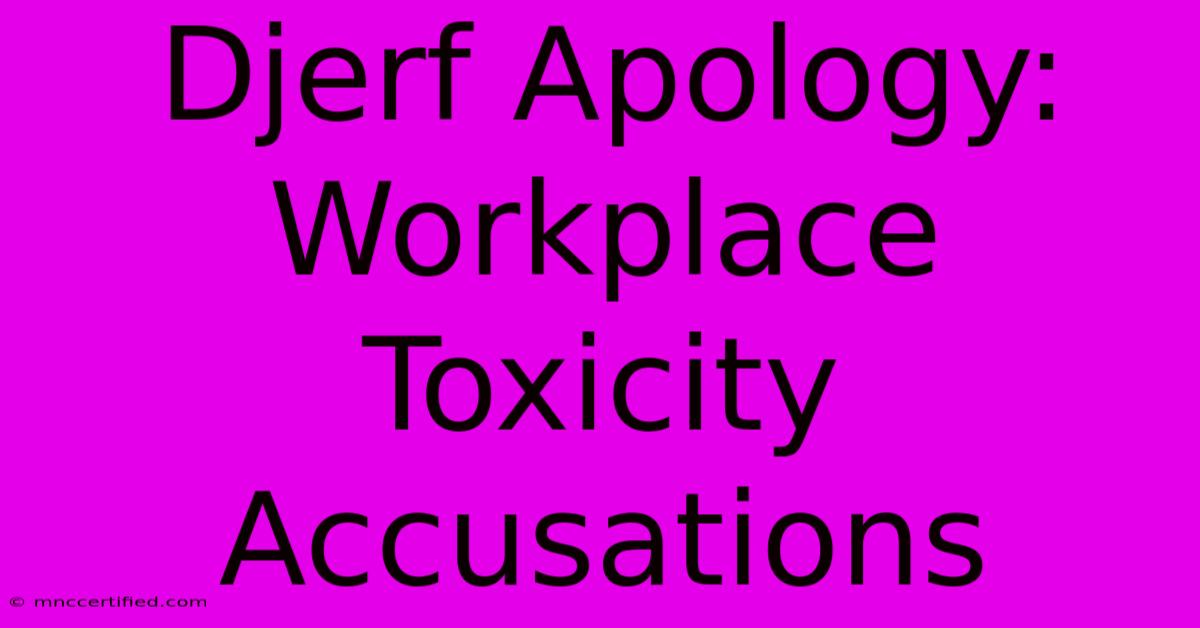Djerf Apology: Workplace Toxicity Accusations

Table of Contents
Djerf Avenue Apology: Addressing Workplace Toxicity Accusations
The recent apology issued by Djerf Avenue, a prominent fashion and lifestyle brand, regarding allegations of workplace toxicity has sparked widespread discussion. This article delves into the accusations, the subsequent apology, and the broader implications for workplace culture and brand reputation. Understanding this situation offers valuable insights for businesses striving to cultivate positive and healthy work environments.
The Accusations: A Culture of Toxicity?
Numerous accusations against Djerf Avenue surfaced online, painting a picture of a deeply problematic work environment. These allegations included claims of:
- Unrealistic workloads and excessive hours: Employees reported consistently working long hours, often exceeding healthy limits, leading to burnout and mental health issues. This is a common issue within the fashion industry, but the severity reported here raised serious concerns.
- Lack of respect and unprofessional conduct: Accounts detailed instances of verbal abuse, bullying, and a general lack of respect from management towards employees. This creates a hostile work environment, hindering productivity and employee well-being.
- Insufficient compensation and benefits: Reports suggested inadequate pay for the demanding workload, coupled with a lack of appropriate benefits, further exacerbating the negative work experience. This highlights the imbalance between expectations and compensation.
- Lack of diversity and inclusion: Some accounts also highlighted a lack of diversity within the company and alleged discriminatory practices, creating an unwelcoming atmosphere for certain groups. This points to a larger issue of systemic inequality within the workplace.
These accusations, regardless of their individual veracity, collectively portrayed a picture of a toxic and unsustainable work environment. The sheer volume of similar claims amplified the severity of the situation and demanded a response.
Djerf Avenue's Apology: A Step Towards Accountability?
Following the wave of accusations, Djerf Avenue released a public apology, acknowledging the issues raised and promising changes. The sincerity and effectiveness of this apology are, however, subject to ongoing evaluation. Key elements of the apology included:
- Acknowledgement of wrongdoing: The brand directly acknowledged the validity of some of the accusations and expressed regret for the negative experiences faced by employees.
- Commitment to change: Djerf Avenue outlined plans to implement significant changes within the company culture, including improved employee support, revised work practices, and diversity and inclusion initiatives.
- Third-party investigation: The apology also mentioned a commitment to conducting a thorough third-party investigation to further examine the claims and identify areas for improvement. This demonstrates a willingness to address the issue transparently.
The Importance of Workplace Culture: Beyond Apologies
The Djerf Avenue situation underscores the crucial importance of fostering a healthy and respectful workplace culture. A toxic environment not only harms employees but also severely damages a brand's reputation, impacting its long-term sustainability and success. Key factors contributing to positive workplace cultures include:
- Open communication and feedback mechanisms: Creating channels for employees to voice concerns without fear of retribution.
- Fair compensation and benefits packages: Ensuring employees are adequately compensated for their work and provided with necessary benefits.
- Respectful leadership and management: Promoting a culture of respect, empathy, and collaboration at all levels.
- Diversity, equity, and inclusion initiatives: Actively promoting diversity and inclusion, ensuring a welcoming environment for all employees.
- Work-life balance initiatives: Implementing policies and practices that support employees' well-being and promote a healthy work-life balance.
Long-Term Impact and Lessons Learned
The long-term impact of this situation on Djerf Avenue's brand image and future success remains to be seen. However, the incident serves as a stark reminder for all businesses of the importance of prioritizing employee well-being and fostering a positive work environment. The effectiveness of Djerf Avenue's response will be judged not only by its apology but also by the tangible changes it implements and its commitment to sustaining a healthy workplace culture going forward. The focus should shift from damage control to genuine reform and a commitment to ethical business practices. This case study will undoubtedly be analyzed for years to come, serving as a critical lesson in responsible business leadership and ethical workplace management.
Keywords: Djerf Avenue, workplace toxicity, apology, fashion industry, brand reputation, employee well-being, toxic work environment, ethical business practices, diversity and inclusion, work-life balance, corporate social responsibility, accountability, third-party investigation, sustainable business practices.

Thank you for visiting our website wich cover about Djerf Apology: Workplace Toxicity Accusations. We hope the information provided has been useful to you. Feel free to contact us if you have any questions or need further assistance. See you next time and dont miss to bookmark.
Featured Posts
-
Sherrock On Littlers Disrespectful Talk
Dec 18, 2024
-
Mudryk Faces Career Ruin Drug Test Fails
Dec 18, 2024
-
Latvian Athletes Death In Moscow Suicide
Dec 18, 2024
-
Mc Kennies New Role Juve Vs Cagliari
Dec 18, 2024
-
Two Charges Against Barton Vine And Ward
Dec 18, 2024